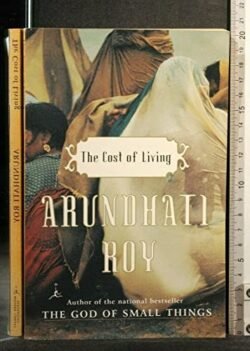In “The Cost of Living,” Roy turns her attention from fiction to activism, offering a scathing analysis of the contemporary global order. The book is divided into two primary essays, “The Greater Common Good” and “The End of Imagination,” each addressing critical issues of development and nuclear armament, respectively. Through these essays, Roy challenges the reader to consider the moral and ethical implications of progress and security as defined by governmental and corporate interests.
Themes and Analysis
- Environmental Justice and Development: In "The Greater Common Good," Roy critiques India's big dam projects, particularly the Narmada Valley project, for displacing rural populations and causing environmental harm in the name of economic development. She argues that the true cost of these projects, in terms of human suffering and environmental degradation, far outweighs their purported benefits.
- Nuclear Weapons and Nationalism: "The End of Imagination" is Roy's response to India's nuclear tests in 1998. She condemns the nationalist fervor that surrounded the tests, questioning the logic of pursuing nuclear weapons as symbols of national pride and security. Roy challenges the notion of nuclear deterrence, highlighting the existential threat that such weapons pose to humanity.
- Globalization and Neoliberalism: Throughout her essays, Roy critiques the forces of globalization and neoliberalism, arguing that they exacerbate inequality, erode democratic institutions, and plunder natural resources. She calls for a reevaluation of what is considered "development" and who it truly serves.
Significance
“The Cost of Living” showcases Roy’s ability to blend lyrical prose with incisive political analysis. Her essays are a call to action, urging readers to question the status quo and consider the impact of political and economic decisions on the most vulnerable populations. Roy’s work is significant not only for its critique of specific policies and practices but also for its broader examination of the values and assumptions underpinning modern society.
Arundhati Roy’s “The Cost of Living” is a powerful critique of contemporary global issues, from unchecked development and environmental destruction to the dangers of nuclear proliferation. Through her compelling essays, Roy invites readers to reflect on the true costs of living in a world driven by power and profit. Her work remains relevant as a critical voice in discussions about development, security, and the future of the planet.
If the summary caught your interest,
Consider reading the full book on AbeBooks.
Explore this book on AbeBooks
